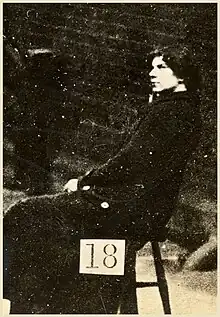Miriam Pratt
Miriam Pratt (26 January 1893 – 24 June 1975) was a British Suffragette and arsonist based in Norfolk who is known for setting fire to buildings in Cambridge.
Miriam Pratt | |
|---|---|
 | |
| Born | 26 January 1893 |
| Died | 24 June 1975 (aged 82) |
| Nationality | British |
| Occupation(s) | teacher and suffragette |
| Known for | arson |
| Spouse | Bernard Francis |
Early life
Pratt was born in Windlesham, Surrey in 1893. When she was eight she went to live with her childless aunt, Harriet, and her husband William Ward. William Ward was a police officer.[1]
Suffragette activity
She joined the suffragettes, other leading suffragettes in Norfolk included Caprina Fahey, Princess Sophia Alexandra Duleep Singh, and Grace Marcon.[2]
In 1913 she was working at St Paul's National School in Norwich. On 17 May 1913 Pratt and another unnamed person used paraffin soaked cloths to set alight to two buildings that were unoccupied. For some reason she left her gold watch at the scene of the crime[3] and this watch was later identified by her uncle William Ward as a watch he had given her.[1] There was also blood where a window had been interfered with and Pratt had a wound. The two buildings burnt were a new house and a laboratory intended for the use of University of Cambridge women students. Pratt made the point that although women were getting a university education, they were not being allowed to be given university degrees because of their gender.[4]
She was arrested on 22 May 1913, and she was suspended from her job. She was remanded for a few days before a friend (and later Member of Parliament), Dorothy Jewson, paid the £200 bail. She was at a protest at her local market against the Cat and Mouse Act in Norwich while awaiting trial.[4]
When the case went to court in October, she decided to be her own defence counsel. She interrogated her uncle, a police officer, as his evidence to the court had been based on conversations with her that he had made without giving her a police caution. However, she was convicted based on her own confession given in her summing up of the case.[4] She was sentenced by Mr. Justice Bray to eighteen months in jail, was sacked from her job and was taken to Holloway Prison.[3] Pratt went on hunger strike for five days and was force fed.[5] She was released under the terms of the Cat and Mouse Act as the doctor was concerned about her heart from the force feeding, with the medical recommendation of three months' rest.[6]
After her arrest, Pratt had her photo taken while she was in prison.[4] This photo was combined with others to create a page that could be shown to policemen so that they could identify suspicious characters. She was labelled number 18 on a sheet that also included Jennie Baines, Lillian Forrester, Clara Elizabeth Giveen, Miss Johansen, Lilian Lenton, Kitty Marion (Katherina Maria Schafer) and Mary Raleigh Richardson. These sheets were circulated in 1914.[7]
Later life
Pratt left the WSPU when the organisation stopped its campaigning for suffrage and its leadership pivoted into support for the First World War. She returned to Norwich and married Bernard Francis on 19 May 1915. He had been a member of the Men's League For Women's Suffrage and joined the Royal Engineers early in WWI, reaching the rank of Lieutenant.[4]
In 1936, William Ward (the uncle in the court case), died and left his niece, now called Miriam Francis, a half share of his property. By then she had moved to London and worked as an Assistant Company Secretary.[4]
Pratt died age 82 in 1975 in Horton Hospital in Epsom, Surrey.[4]
References
- "The Norwich Suffragette whose uncle sent her to prison". Eastern Daily Press. 2022-05-15. Retrieved 2023-05-24.
- Briscoe, Kim (2 November 2017). "Call for public's help to piece together life of Norfolk suffragette Caprina Fahey". Eastern Daily Press. Archived from the original on 2019-10-03. Retrieved 2019-10-12.
- "Miriam Pratt - National Portrait Gallery". www.npg.org.uk. Retrieved 2023-05-24.
- "Miriam Pratt". Spartacus Educational. Retrieved 2023-05-24.
- Riddell, Fern (2018). Death in ten minutes: Kitty Marion: activist, arsonist, suffragette. London: Hodder & Stoughton. ISBN 978-1-4736-6618-4.
- Blanchard, Gill (2020). Struggle and Suffrage in Norwich: Women's Lives and the Fight for Equality. Pen & Sword.
- "'Surveillance Photograph of Militant Suffragettes' - National Portrait Gallery". www.npg.org.uk. Retrieved 2023-05-24.